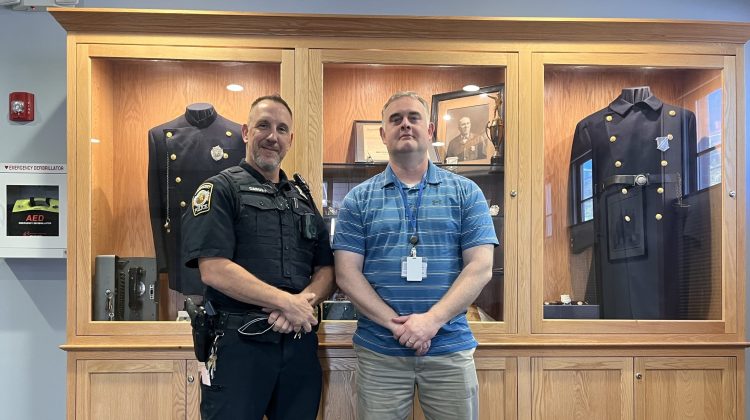SWAMPSCOTT — When it comes to mental health and supporting people in crisis, the Swampscott Police Department has been working hard to break down the stigma with its Mental Health Task Force in order to bridge the gap between police officers and those who may struggle.
Police Officer Sal Caruso and Eliot Human Services Jail Diversion Clinical Coordinator Mike Lawrence sat down with The Item to talk about the initiative and how they hope to break down the stigma of addressing struggles with mental health.
Caruso explained how the Department of Mental Health gives grants to different police departments. He added that one grant, in particular, is split between Swampscott and Lynnfield for the task force.
“What this allows us to do is have a clinician that can respond with police at the moment,” Caruso said. “A lot of what we end up doing is a lot of follow-up work and community outreach… Oftentimes, we’re the first ones to interact with somebody that’s suffering from a mental health crisis. And for us to be able to put them in contact with Mike (Lawrence) and give them a path, that’s a big thing for somebody because it’s hard to navigate.”
Lawrence said that connecting residents with Eliot’s services “really helps because it’s the major mental health service provider for the area, and so people will have access to all their resources.”
Caruso described the task force as the “conduit” that helps put people in connection with Eliot in order to seek further help. He noted that throughout the month of August, the Department responded to approximately 29 calls for people in crisis and well-being checks.
Lawrence explained that while Caruso helps run the program, there are about 12 other officers who have been trained to respond and assist a person in crisis if Caruso isn’t available. Caruso said there is always at least one trained officer on every shift.
Caruso added that having Lawrence bring his experience and knowledge on how to handle mental health issues has been “invaluable,” noting that Lawrence will join Caruso on calls where a person is actively in crisis.
“Our main goal is to eliminate the stigma of people with mental health who might be afraid to say anything,” Caruso reiterated. “It’s no different than any other illness, and nobody should be ashamed to go through it… It doesn’t make you weak to get help.”
Lawrence elaborated on the role he plays within the initiative and his background work with mental health.
“I’ve done mental health work for about 25 years, and I was a part of the first Jail Diversion programs (the technical name for the initiative) through Watertown and Waltham,” Lawrence said. “I’ve gained a lot of experience, and we respond to acute situations, do follow-ups, community outreach… We just try to get people to be where they need to be.”
He said he spends 20 hours a week at the Swampscott Police station and then another 20 at Lynnfield’s.
Caruso mentioned how the first interaction a person in crisis has with police is a critical moment, with the goal of being both approachable and understanding.
“The first interaction is so important because if it’s a bad one, they might go in a different direction — but if it’s a good interaction, it helps them understand that there’s help here, and that we take it seriously… That means a lot to me, that they get the help they need,” Caruso said.
He continued that sentiment, noting that police departments’ approach to people in crisis has changed drastically over time.
“It’s changed compared to when I first came on. At first, maybe there wasn’t as much empathy for people that were suffering with addiction or their mental health, to now, where you have a bunch of empathetic cops that really want to help out,” Caruso said.
He continued, “And it’s really unfortunate because it was just a different time… I think the world is changing and that it’s OK to not be OK. That’s a really big thing for people to know.”
Caruso said Police Chief Ruben Quesada has supported the initiative in “every way” throughout the process.
Another element they reiterated was the Department’s commitment to community outreach. They emphasized that the Swampscott Police Department will be looking into how to incorporate touching upon important topics like mental health in events in the future.




